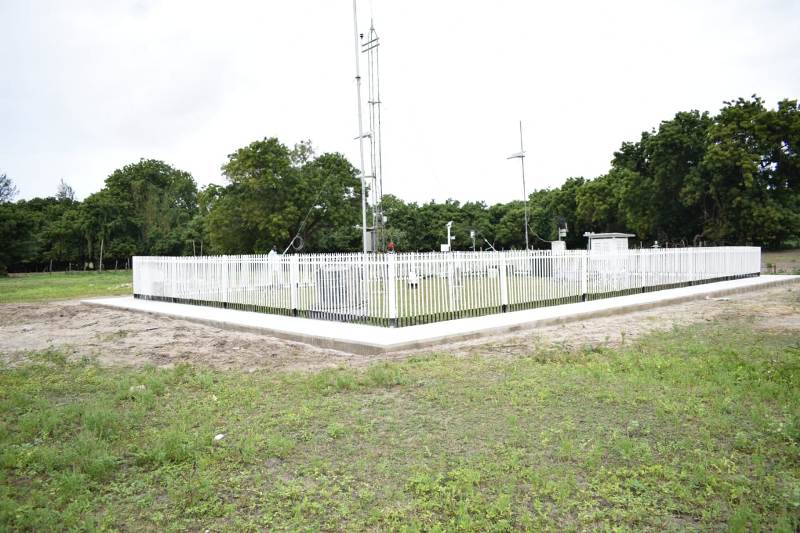Untold Story of Climate Change ‘Ghost’

Pwani University sociologist Prof Dr Halimu Shauri admiring the Vertical Farming Technology’s produce of horticulture at the Mwangaza Children's Home in Kilifi Township Photo by Mwakwaya Raymond
BY MWAKWAYA RAYMOND
Email: thecoastnewspaper@gmail.com
Shifting temperatures and changing rainfall patterns to more extreme and unpredictable weather are threatening human health, social order and economic development in Kenya’s coastal region.
Survey conducted by this writer indicate that most of the five regional counties of Kwale, Taita Taveta, Kilifi, Tana River and Lamu’s hinterlands are facing unprecedented climate trends that are sensitive to sectors like agriculture, fishing and tourism.
With climate change, everything has stopped running resulting into a fight between sciences and traditions over the increasing and unexplained temperatures, changing precipitation patterns outside the previous long rains of March-April-May and short of October-November-December and rising sea levels.
This hocus-pocus has caught the attention of a Kaya elder Vincent Mwachiro who believes modernity and sciences have adversely interfered with Coastal weather patterns that naturally were Mulungu’s gift to humankind.
“Mulungu is simply angry and he’s punishing his descendants for unholy activities conducted within and without the precincts of the nine Midzichenda Kaya Forests scattered in Kilifi and Kwale Counties,” he alleges in an interview.
The harsh climate conditions bedeviling many parts of the lower region are because of the desecration of different Kaya shrines mete out by unscrupulous Kaya elders using them for political expediencies and cutting down of indigenous forests through illegal human activities.
CLIMATE SHOCKS
The immediate hinterlands of the Ten-Mile Coastal strip are arid and semi-arid lands with recurrent climate ‘shocks’, especially drought and floods constantly causing food, nutrition and water insecurity.
Ganze Subcounty of Kilifi has endured the brunt of such climate ghosts for long periods of seasons resulting not only to drying up of traditional mitsara (man-made dam) but also malnutrition, morbidity and death.

Kaya elder Vincent Mwachiro in his full Kaya regalia greeting President Uhuru Kenyatta during one of his past event while in a tour of the Coast region
Photo by Courtesy
According to Kilifi’s agriculture county executive committee member (CeC) Dr Luciana Sanzua poverty index in the County stands at 71.7 per cent with many areas facing food insecurity affecting approximately 67 per cent of the households.
“A larger number of the locals depend on agricultural activities with 52.7 per cent engaging in small scale farming under harsh unpredictable weather conditions,” she says.
She identifies three constituencies of Ganze, Kilifi South and Kaloleni as some of those registering very high levels of poverty in their most remote areas.
Most of Kilifi’s hinterlands are prone to droughts and floods during long or short rains that compromise productivity and food security in the County, thus, posing perennial challenges to peasant farmers.
This is disturbing Dr Sanzua who says very few farmers heeds the call to employ a number of on-farm strategies to cope with climate risks and shocks, utilisation of drought-resistant crop varieties, water harvesting despite being advised year in, year out.
According to Kenya’s documents sent to the United Nations framework convention on climate change the country needs about Sh6.696 trillion ($62 billion) to mitigate and adapt to the climate crisis in the next ten years. This equates to almost 67 per cent of nation’s GDP.
For instance, in 2018, floods displaced 230,000 people including 150,000 children, apart from drowning 20,000 livestock and leading to the closure of 700 schools.
The country also lost 8,500 hectares (21,000 acres) of crops in a country where 84 per cent of the land is arid and semi-arid, with poor infrastructure and other developmental challenges, leaving less than 16 per cent of the land to support over 80 per cent of the population.
WEATHER-DEPENDENT
With farmers such as Thoya Mwavuo Hinzano of Madunguni village of Malindi Subcounty almost entirely weather-dependent survive on cassava, poultry and dairy cattle on his three-acre farm for livelihood.
He says poor infrastructure, few agricultural extension officers, poor quality and eroded soils, as well as low agricultural input use are some of the key challenges exposing farmers to the wrath of climate change.
According to him the main barriers to wider adoption of these strategies is knowledge of new technologies and the know-how to implement them, the inaccessibility of inputs due to high costs are another big challenge to farmers.
“There are no off-farm services for supporting farmers in dealing with effects of climate change in Kilifi County. We don’t get early warning information on drought risks, food security assessments” he adds.
He notes that efforts by several non-governmental organizations to intervene and arrest the situation have not borne fruits because they only appear during disasters such as the World Vision (WV) and Kenya Red Cross (KRC).
Previously the chief officer for agriculture and livestock, Fredrick Kaingu, now chief officer water, says diversification of livestock may safeguard pastoral livelihoods in the drier hinterlands of coastal counties.
“My views, based on climate change, farmers should now think of keeping manageable number of livestock and use stocking rate, stratified production, migration and diversification of yield productions to survive and adapt to these harsh prevailing conditions in Kenya,” he says when contacted for comments.

Meteorological station that gives weather alerts or reports to the lower coast region bordering the Indian Ocean
Photo by Mwakwaya Raymond
To deal with climate shocks, the Kilifi director of meteorology Jonathan Munga believes science-based climate information provision and use by small-and-large-scale farmers can be a cornerstone of climate change adaptation.
“Our climate alerts or reports play a critical role for sustainable livelihoods and development but few farmers or government agencies take serious interest in them,” he says adding that uptakes and use of climate information should be a priority to fight climate crises.
For Kilifi farmers to benefit from their lands, he wants them to constantly liaise with his office so that they can benefit from first-hand information about the changing patterns of temperature and rainfall.
The local farmers are urged to take interest in the frequent advisories and alerts that give information on different aspects of the atmosphere which can be useful for their farming activities.
MODE OF FARMING
Through the assistance of Harsh Properties Limited which introduced a new mode of farming, has seen Rev John Nyamawi of Mwangaza Children’s Home produce enough food crops for its own consumption and for selling to generate income.
To beat the odds of climate change, the Home has adapted vertical farming technology (VFT) to produce enough food to eat for its orphans and workers alike.
Juxtaposed to climate shocks is health and nutrition whose distribution among the people is unevenly defined according to geography, gender, socioeconomic status, disability, ethnicity and age within the region is traditions versus sciences.
As for Mzee Mwachiro traditions should not be ‘rubbished’ for sciences when dealing with climate shocks in the Midzechenda landscape in Kwale and Kilifi counties.
“People should discard notions that when Kaya elders’ intervention on social, political and economic aspects they are engaging in utsai (superstition) instead of African rites and rituals to their gods to appease them,” he says.
Though he partially agrees with the Kaya elders, Pwani University sociologist, Prof Dr Halimu Shauri questions their beliefs on modern sciences which he says use investigative or research tools to understand the behavioural aspects of the climate change.
“It’s true people used to go to the bush and pray to their gods and things happened but that should not justify the dismissal of sciences in dealing with the ghosts of climate change,” he says when speaking to this writer.
BOOK OF EXODUS
But climates shocks, according to the Rtd Anglican Church of Kenya (ACK) Bishop Julius Kalu, are not ‘strange’ as they have been narrated in the Book of Exodus in the Old Testament.
In his views, it took 40 years for the Israelites to move from Egypt to the Promised Land of Canaan and they did so through the help of the cloud.
“In other words, the Israelites only moved when the cloud moved and stopped when it stopped and that’s climate change and there is nothing much to worry about,” he adds. The only worry, in his view, is what the government is doing to ensure no life is lost due to the onslaught of climate change.
What he wants the government to do is put in place mitigation mechanisms that will ensure every Kenyan adapts and transforms against the shock events occasioned socially, economically or politically.
On the perennial droughts and floodings in the region, a healthcare officer not authorised to speak to the media says mental disorders are common diseases especially among the marginalised groups due to their effects.
“This cadre of the people is the most vulnerable in terms of their geographical contexts, financial abilities, socioeconomic aspects and healthcare accessibility,” the officer adds.
The medic is concerned that the government does not have a separate budget for mental health saying the country need such budget to deal with the massive numbers of people who suffer silently under the climate change.
Again, according to the officer most counties are not fully sensitised about mental health and how shifting temperatures or changing rainfall are a burden to the mental health of their people.
“Can you imagine the anxiety and mental torture people of Tana River County suffer whenever they are told to vacate their homesteads due to threats of floods occasioned by heavy rains in Mount Kenya region?” he poses saying the government should not only secure them but also ensure their mental health illness is addressed.
To ensure this happens, the officer wants the six regional counties to set up budgets to cushion such people so as to derive livelihoods from a variety of economic activities ranging from small-scale agriculture, livestock production and fishing.
Edited by Mwakera Mwajefa

